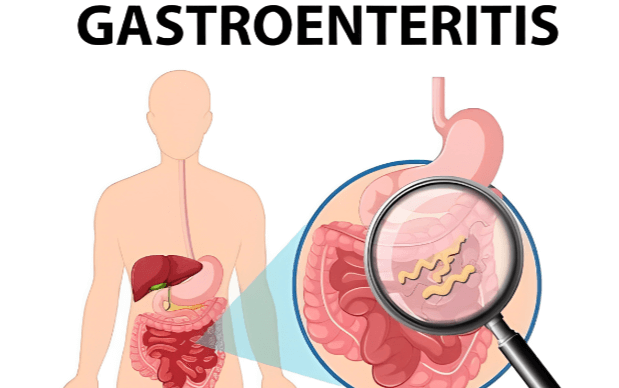wellhealthorganic.com : key signs of gastroenteritis

Introduction to Gastroenteritis
Gastroenteritis, commonly referred to as the stomach flu, is an inflammation of the gastrointestinal tract, which includes the stomach and the intestines. This condition can be caused by various infectious agents such as viruses, bacteria, and parasites, which lead to a range of symptoms that can disrupt daily activities and overall health.
Understanding Gastroenteritis
Definition
Gastroenteritis is the medical term for the inflammation of the lining of the intestines and stomach. This inflammation results from harmful microorganisms or toxins and leads to rapid onset of symptoms such as diarrhea and vomiting.
Causes and Risk Factors
The most common causes of gastroenteritis are viral infections like norovirus and rotavirus. Bacterial infections such as E. coli, Salmonella, and Campylobacter, and parasites like Giardia are also notable causes. Risk factors include poor hand hygiene, consumption of undercooked meats, untreated water, and close contact with individuals who have gastroenteritis.
Common Symptoms of Gastroenteritis
The symptoms of gastroenteritis can vary from mild to severe and may include an array of uncomfortable effects.
Physical Symptoms
Diarrhea
Frequent, watery stools are a hallmark of gastroenteritis, often occurring suddenly and causing dehydration.
Vomiting
Along with diarrhea, vomiting is another common symptom that helps eliminate ingested toxins but can lead to dehydration if fluids are not adequately replaced.
Stomach Pain
Cramps and abdominal pain are typical, resulting from the intestines reacting to the infection or irritation.
Systemic Symptoms
Fever
A mild to moderate fever may occur as the body fights off the infection.
Fatigue
Energy levels often drop due to the body’s resources being directed towards fighting the infection and due to dehydration.
Dehydration
Signs of dehydration include dry mouth, decreased urine output, and severe thirst, and it’s a frequent complication of prolonged vomiting and diarrhea.
Diagnostic Approaches
Determining the cause of gastroenteritis is crucial for effective treatment and management.
Medical History and Physical Exam
What to Expect
Doctors usually start with a thorough medical history and a physical exam to check for signs of dehydration and abdominal pain.
Key Questions
Patients might be asked about recent food consumption, travel history, and exposure to others with similar symptoms.
Laboratory Tests and Imaging
Blood Tests
These can help determine the severity of dehydration or whether there is a bacterial infection requiring antibiotics.
Stool Analysis
A sample of stool can be analyzed to detect the presence of specific pathogens.
Imaging Techniques
While not typically required, imaging tests like abdominal ultrasounds are used if complications are suspected.
Treatment Strategies
Treatment for gastroenteritis focuses on symptom relief and prevention of dehydration.
Home Remedies
Hydration
Drinking plenty of fluids such as water, broth, and oral rehydration solutions is crucial.
Diet Management
Eating bland, easy-to-digest foods like bananas, rice, applesauce, and toast (BRAT diet) can help ease symptoms.
Medical Treatments
Medications
Over-the-counter anti-diarrheal medications and antiemetics can be used under guidance to relieve symptoms.
When to Seek Hospital Care
Hospitalization may be necessary for severe cases characterized by dehydration, high fever, or blood in vomit/stool.
Preventive Measures
Prevention focuses on hygiene and food safety to avoid the spread and occurrence of gastroenteritis.
Personal Hygiene
Handwashing Techniques
Regular and thorough handwashing with soap and water is one of the best ways to prevent gastroenteritis.
Safe Food Practices
Proper food handling and avoiding raw or undercooked meats can prevent many cases of bacterial gastroenteritis.
Environmental and Community Health
Clean Water Supply
Ensuring access to clean water is critical in preventing viral and parasitic gastroenteritis.
Public Sanitation
Effective sewage disposal and public cleanliness are vital for preventing the spread of infectious agents.
When to Seek Medical Help
Knowing when to seek professional help can prevent complications.
Read also wellhealthorganic.com : remove dark spots on face tang – lemon juice
Signs of Severity
High Fever
A fever higher than 102°F (39°C) indicates a need for medical evaluation.
Persistent Vomiting
If vomiting persists for more than two days, it’s crucial to seek medical attention to prevent severe dehydration.
Signs of Dehydration
Rapid heart rate, lightheadedness, and reduced urine output are urgent signs needing immediate care.
Living with Gastroenteritis
Managing gastroenteritis involves dietary adjustments and understanding how to cope with the condition.
Dietary Adjustments
What to Eat
Maintaining a diet with sufficient hydration and nutrients is crucial during recovery.
Foods to Avoid
Spicy, fatty, or dairy products should be avoided until full recovery.
Long-Term Management
Follow-up Care
Monitoring for any recurring symptoms or complications is important, especially for individuals with weakened immune systems.
Coping Strategies
Understanding and managing the dietary and lifestyle adjustments necessary for recovery can help ease the experience of living with gastroenteritis.
Read also Breath for Sale Nguyen Duy Tri • Jungle of You • 2022
FAQs on Gastroenteritis
- What exactly causes gastroenteritis? Gastroenteritis is caused by infections from viruses, bacteria, or parasites that lead to inflammation in the gastrointestinal tract.
- How can I differentiate gastroenteritis from other digestive issues? Gastroenteritis is typically marked by sudden onset of diarrhea, vomiting, and sometimes fever, which are less common in other digestive disorders.
- Is gastroenteritis contagious? Yes, gastroenteritis can be highly contagious, spreading through contaminated food, water, or contact with an infected person.
- How long does gastroenteritis last? Most cases of viral gastroenteritis are resolved within a few days, but bacterial infections may last longer and require antibiotics.
- Can gastroenteritis be prevented? Good hygiene, proper food handling, and vaccinations (like those for rotavirus) can help prevent many cases of gastroenteritis.
- When should someone with gastroenteritis see a doctor? Medical attention should be sought if there is severe pain, high fever, persistent vomiting, signs of dehydration, or blood in the stool or vomit.
Conclusion
Understanding the key signs of gastroenteritis and how to manage them can greatly aid in quicker recovery and prevention of severe complications. Maintaining good hygiene and seeking medical advice when symptoms are severe are essential steps in handling gastroenteritis effectively.
Further Information and Support For more information on managing gastroenteritis, consult healthcare providers or visit wellhealthorganic.com for guidance and resources.




